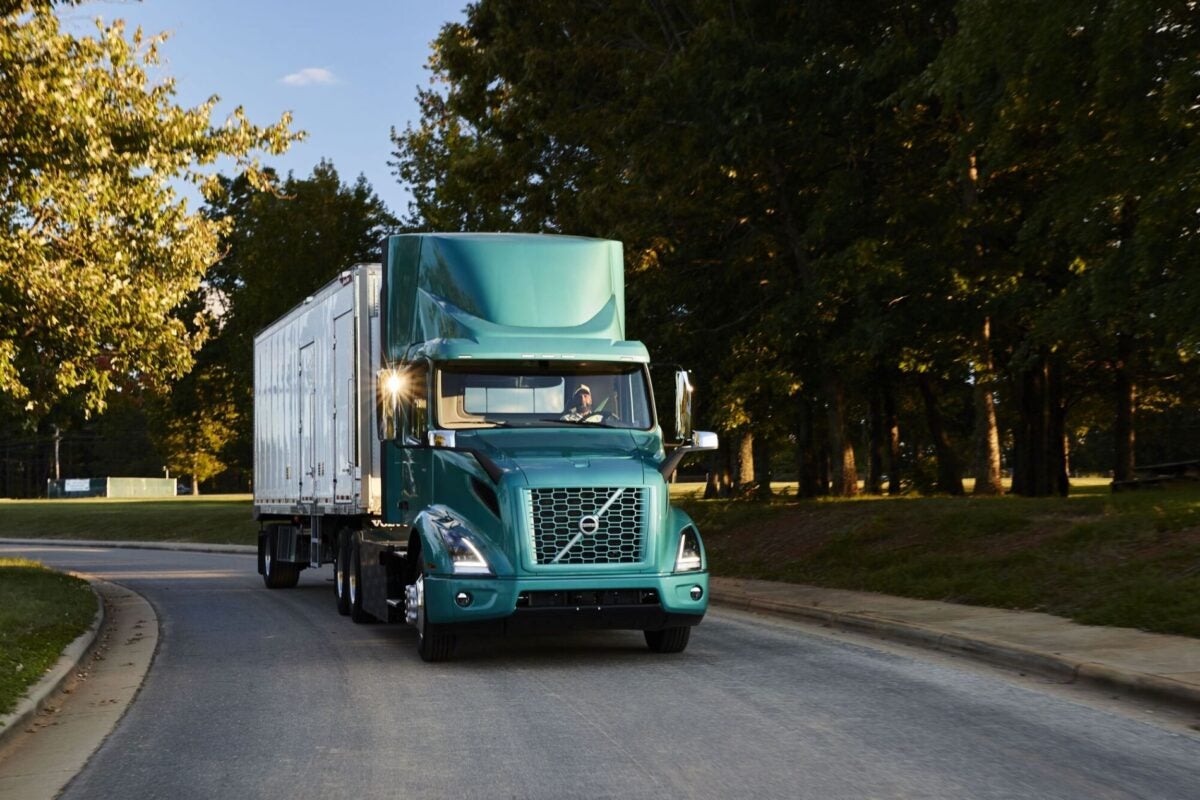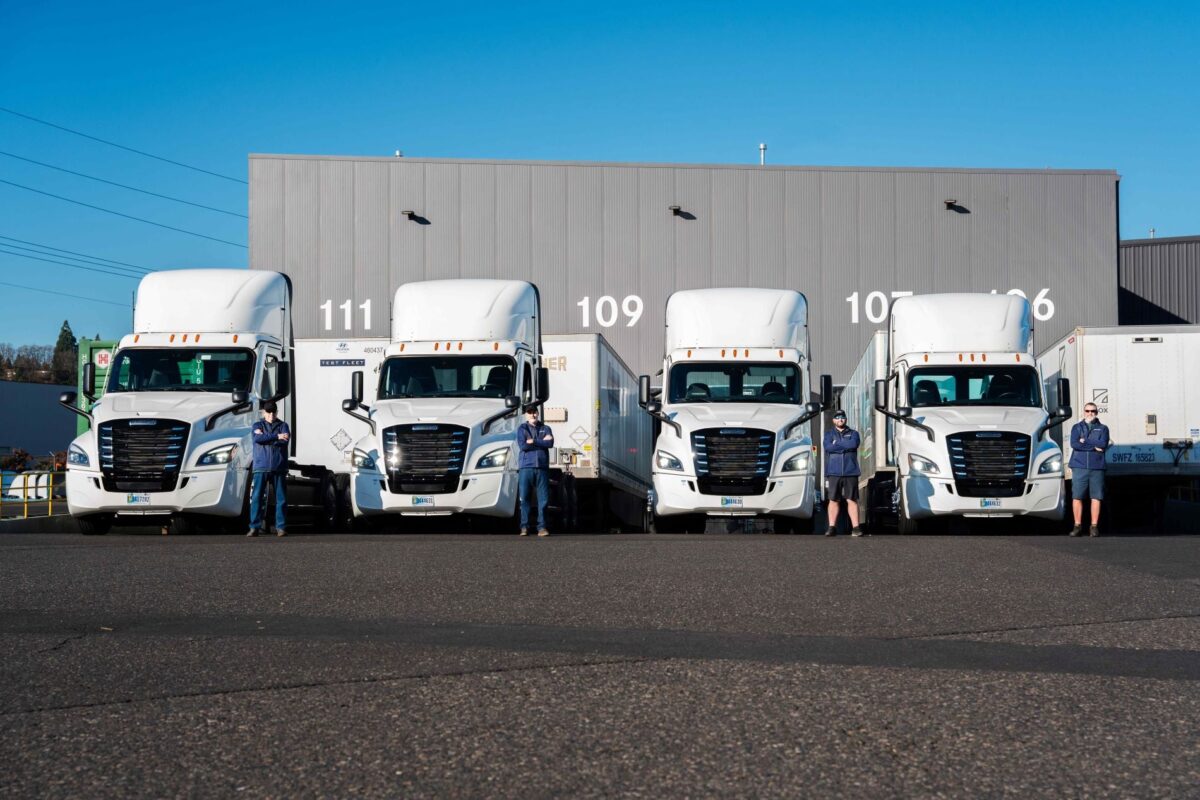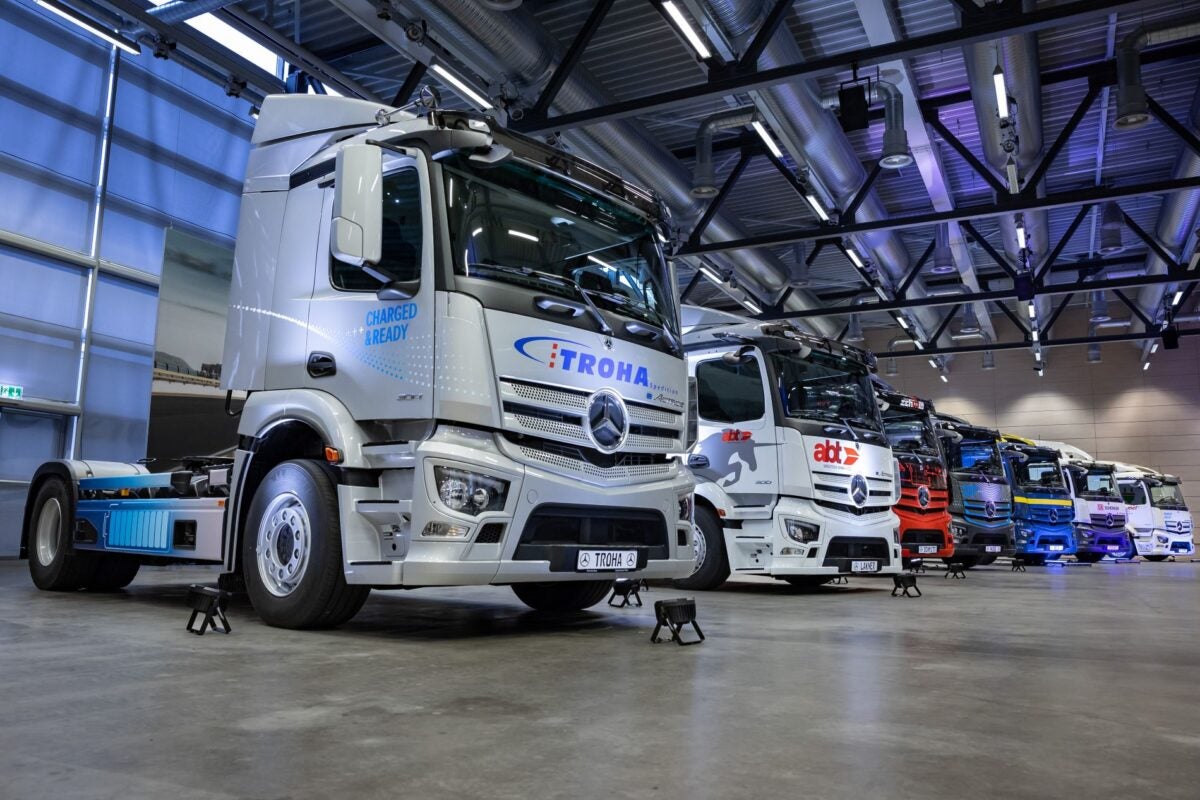[ad_1]
Using electric trucks for short, repeatable trips to assembly plants is expanding as more OEMs require suppliers to shush the noise and eliminate the diesel exhaust that accompany delivering incoming parts and components.
How did inbound logistics become a thing in an industry where change most often meets resistance? For their own reasons, stakeholders from sustainability-conscious shippers to regulators and OEMs like inbound logistics as a use case for electric trucks.
Was this newsletter forwarded to you? Click here to get Truck Tech via email on Fridays. And catch the latest in major events and hear from the top players on “Truck Tech” at 3 p.m. Wednesdays on the FreightWaves YouTube channel.
“The reason this is a good early adopter is that the trucks stay close to base. But [they] can get a fair amount of miles, at least for the short return-to-base, heavy-duty day cab tractor segment,” said Mike Roeth, executive director of the North American Council for Freight Efficiency (NACFE).
Ideal use case
During my visit to the sprawling Volvo Trucks North America (VTNA) New River Valley Operations site in Dublin, Virginia, this week, plant communications chief Sally Davies told me VTNA has accumulated 95,000 miles of electric driving on short routes bringing parts and supplies to the plant.
Watsontown Trucking Co. and Camrett Logistics ordered Class 8 VNR Electric trucks in October 2021 and put them into service on round trips to NRV in December of that year. Ryder System Inc. began operating seven VNR Electric trucks, transporting assembly kits of components for heavy-duty Mack trucks to a kitting facility in Pennsylvania.

‘Manufacturing shuttles’
“We call these manufacturing shuttles,” Roeth said, pointing to Schneider’s execution of electric trucks during NACFE’s Run on Less Electric Depot program last year. Schneider calls this the “next truck up” system. It replaced two-driver slip-seating. “[The driver] returns the truck to the depot, starts charging and jumps into another fully charged truck,” Roeth said. Schneider has 92 eCascadias in its fleet today and a 4.8-megawatt charging facility in El Monte, California, capable of charging 32 trucks at a time.
NFI Industries, an early partner of Daimler Truck North America (DTNA) in piloting Class 8 Freightliner eCascadias, tried this at its Chino, California, depot in early 2020.
DTNA began integrating eCascadias into its own logistics operations in Portland, Oregon, in November. The trucks use the company’s Electric Island heavy-duty truck charging station that opened in 2021 near its Portland headquarters. The four electric trucks initially deployed pick up parts from Pacific Northwest suppliers and deliver them to DTNA’s consolidation center.

‘Sustainable future’
“By integrating electric trucks into our inbound logistics network, we aim to reduce our environmental impact and contribute to a more sustainable future that goes beyond truck development and manufacturing,” Jeff Allen, DTNA senior vice president, operations and specialty vehicles, said in a November news release.
In December, Daimler’s Mercedes-Benz Trucks brand delivered a dozen electric trucks to logistics service. Beginning this quarter, the trucks will complete 50 all-electric inbound logistics runs to its largest plant in Wörth, Germany. The goal is to electrify 100% of delivery traffic to Wörth by the end of 2026.
“Electric trucks can already cover the majority of delivery routes over short and medium distances,” Karin Rådström, CEO Mercedes-Benz Trucks, said in December. “We want to leave the smallest possible carbon footprint across the entire value chain [including] inbound logistics at our Wörth plant.”

Is Mack’s $14.5M Roanoke plant expansion a shot at the UAW?
The timing of the $14.5 million expansion announcement at Mack Trucks’ medium-duty plant in Roanoke, Virginia, was curious. Why announce good news at 5:30 p.m. on a Friday? One explanation: awaiting a signoff from Gov. Glenn Youngkin’s office. The state is ponying up a $255,000 grant from the Commonwealth’s Opportunity Fund after all.
Or, maybe it helped keep the United Auto Workers off guard and perhaps avoided a protest at the ceremonial groundbreaking at the nonunion plant. Remember, the UAW struck Mack for 39 days last fall. The union representing 3,900 workers settled for a contract it rejected earlier.
The UAW struck Mack’s main assembly plant near Allentown, Pennsylvania, on Oct. 8. Four other facilities — a remanufacturing operation, parts depots in Maryland and Florida, and the Hagerstown, Maryland, engine plant also went down.
That stopped most Mack Class 8 truck builds and crimped deliveries to Volvo Trucks North America’s plant in Dublin, Virginia. Those losses contributed to Volvo losing six-tenths of a point of North American market share in 2023.
The Mack strike focused more on economic gains and local issues than adding new jobs. The UAW never publicly mentioned bargaining to organize the Roanoke plant, where the expansion to make diesel and battery-electric medium-duty trucks will add 51 new jobs and Roanoke County incentives totaling $842,420.
Nikola to Trevor Milton: No thanks, and pay up
Trevor Milton has become Nikola Corp’s version of the proverbial bad penny. He keeps turning up.The founder of the electric truck maker and energy distribution company is awaiting a surrender date on his four-year federal prison sentence from his October 2022 conviction on one count of securities fraud and two counts of wire fraud.
Once Nikola’s largest shareholder by a mile, his stake, according to the Financial Times, hovers around 4.4%. That’s partly due to the company authorizing new stock that diluted his stake as the shares are sold.
Even though an arbitration in which Milton was ordered to pay Nikola $165 million — mostly to cover a Securities and Exchange Commission fine related to Milton’s exaggerations and lies about the company’s technological accomplishments — Nikola avoided directly criticizing him.
That changed Jan. 26 when MIlton submitted a slate of dissident candidates for independent directors.
“The director nominees have no public company experience, add no skills or experience to the board, and indisputably lack the depth of experience that the current Nikola board members bring to the company,” the company said in a statement.
“Mr. Milton … has had zero [company emphasis added] involvement in Nikola’s day-to-day operations since September 2020; however, Nikola continues to suffer harm created by Mr. Milton’s business decisions from over three years ago in his role as founder and executive chairman.”
Oh, and Milton hasn’t paid the $165 million — plus interest — to Nikola, which is “vigorously seeking all legal avenues” to get it.
In California, it’s deja vu all over again
California Gov. Gavin Newsom’s vetoed legislation in September that would effectively ban heavy-duty autonomous trucks in the state. Now, nearly identical legislation is pending in the California State Assembly.
“It’s a commonsense measure that keeps humans on board a truck until we have a plan for our workers and we’re sure that tech bros aren’t jamming unsafe technology down our throats,” State Assembly member Cecilia Aguiar-Curry said at a rally backed by the Teamsters union on Monday.
That’s sounds a lot like last year when Assembly Bill 316 gained support of 90% of Assembly and Senate members before Newsom vetoed it. There was no attempt to override the governor’s veto.
What’s different this time? Conflating some high-profile accidents involving autonomous robo-taxis with what could happen in a crash involving a driverless 80,000-pound truck.
Newsom’s office says it will consider the legislation on its merits.
Briefly noted:
The number of hydrogen stations is dwindling, with Shell the latest to close stations. But commercial truck outlets may replace some of them.
Geotab and Daimler Truck North America are working together to integrate data from Freightliner trucks with Geotab’s advanced fleet management platform.
Cummins is selling the remaining 80.5% of its former filtration business — now called Atmos — and will save about $500 million in taxes in the process.
Truck Tech episode No. 54: Overview of Volvo’s new VNL
Volvo Trucks North America Product Marketing Manager Chris Stadler provides a high-level walkaround of the new VNL, a truck the company says is “designed to change everything.”
That’s it for this week. Thanks for reading and watching. Your feedback and suggestions are always welcome. Write to [email protected].
Have you purchased your discounted tickets for the Future of Supply Chain June 4-5 in Atlanta? What are you waiting for?
[ad_2]
Source link












